Fleurs du Mal Magazine


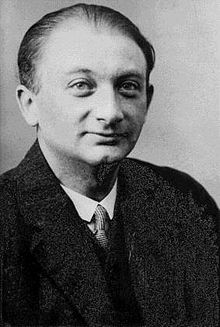
Karneval
Alle Tage feiern wir Karneval,
wir haben es nicht nötig, uns eigens zu maskieren,
weil wir unser eigenes Angesicht verlieren;
wir sind: ein Untertan, ein Sergeant, ein General,
ein deutscher Student mit Bändern und Schmissen,
eine Pickelhaube, ein geschliffenes Bajonett,
ein schleppender Säbel, ein Pastorenbarett,
und eine Prothese, ewig zu hinken beflissen.
Wir sind ein Volk in Masken und Kostümen –
uns schuf ein göttlicher Feldwebel nach seinem Ebenbilde.
Wir sind ein Unteroffiziersverein, eine Millionenmaskengilde,
eine Schupopostenkette, ein fast lebendiger Drahtverhau,
ein betäubender Wirrwar aus Uniformgrau,
unterbrochen von reizenden roten Striemen . . .
Also gekleidet in verschiedene Trachten,
leben wir munter, schießen und bedienen
bald einen Kaiser und bald ein Maschinengewehr – –
Kriege verlierend, gewinnen wir Schlachten,
arbeiten nach dem Lesebuchmuster der Bienen
vierundzwanzig Stunden im Tage und manchmal mehr.
Über uns ein Gott, der Eisen wachsen läßt,
auf einem gelbmaskierten Himmel aus giftigen Gasen,
umgeben von Engeln, die den Fridericus-Rex-Marsch blasen – –
mit eisernen Kreuzen geziert, livriert und betreßt,
nehmen sie teil an unserm Karnevalsfest.
Und ertönt ein Kommando, das ein oberster Kriegsherr rief,
so können wir nicht anders und werden erschossen,
insofern wir Proleten, Juden und Genossen – –
Und flüstern sterbend, dankerfüllt und tief:
Ehre sei dem General in der Höh’ und Kants kategorischem Imperativ!
Joseph Roth
(1894 – 1939)
Karneval
Gedicht, 7. 3· I924
• fleursdumal.nl magazine
More in: Archive Q-R, Archive Q-R, Joseph Roth
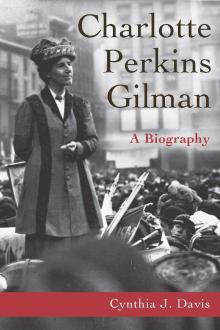
The Anti-Sufragists
Fashionable women in luxurious homes,
With men to feed them, clothe them, pay their bills,
Bow, doff the hat, and fetch the handkerchief;
Hostess or guest; and always so supplied
With graceful deference and courtesy;
Surrounded by their horses, servants, dogs–
These tell us they have all the rights they want.
Successful women who have won their way
Alone, with strength of their unaided arm,
Or helped by friends, or softly climbing up
By the sweet aid of “woman’s influence”;
Successful any way, and caring naught
For any other woman’s unsuccess–
These tell us they have all the rights they want.
Religious women of the feebler sort–
Not the religion of a righteous world,
A free, enlightened, upward-reaching world,
But the religion that considers life
As something to back out of !– whose ideal
Is to renounce, submit, and sacrifice.
Counting on being patted on the head
And given a high chair when they get to heaven–
These tell us they have all the rights they want.
Ignorant women–college bred sometimes,
But ignorant of life’s realities
And principles of righteous government,
And how the privileges they enjoy
Were won with blood and tears by those before–
Those they condemn, whose ways they now oppose;
Saying, “Why not let well enough alone?”
Our world is very pleasant as it is”–
These tell us they have all the rights they want.
And selfish women–pigs in petticoats–
Rich, poor, wise, unwise, top or bottom round,
But all sublimely innocent of thought,
And guiltless of ambition, save the one
Deep, voiceless aspiration–to be fed!
These have no use for rights or duties more.
Duties today are more than they can meet,
And law insures their right to clothes and food–
These tell us they have all the rights they want.
And, more’s the pity, some good women too;
Good, conscientious women with ideas;
Who think–or think they think–that woman’s cause
Is best advanced by letting it alone;
That she somehow is not a human thing,
And not to be helped on by human means,
Just added to humanity–an “L”–
A wing, a branch, an extra, not mankind–
These tell us they have all the rights they want.
And out of these has come a monstrous thing,
A strange, down-sucking whirlpool of disgrace,
Women uniting against womanhood,
And using that great name to hide their sin!
Vain are their words as that old king’s command
Who set his will against the rising tide.
But who shall measure the historic shame
Of these poor traitors–traitors are they all–
To great Democracy and Womanhood!
Charlotte Perkins Gilman
(1860-1935)
The Anti-Sufragists
Suffrage Songs and Verses
• fleursdumal.nl magazine
More in: #Editors Choice Archiv, Archive O-P, Archive O-P, Feminism, The Ideal Woman
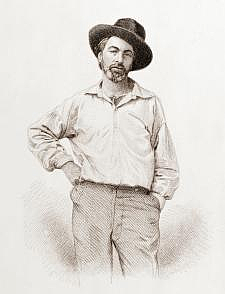
When I Heard the Learn’d Astronomer
When I heard the learn’d astronomer;
When the proofs, the figures, were ranged in columns before me;
When I was shown the charts and the diagrams, to add, divide, and measure them;
When I, sitting, heard the astronomer, where he lectured with much applause in the lecture-room,
How soon, unaccountable, I became tired and sick;
Till rising and gliding out, I wander’d off by myself,
In the mystical moist night-air, and from time to time,
Look’d up in perfect silence at the stars.
Walt Whitman
(1819 – 1892)
Poem: When I Heard the Learn’d Astronomer
• fleursdumal.nl magazine
More in: Archive W-X, Archive W-X, Whitman, Walt

Take all my loves, my love,
yea, take them all
Take all my loves, my love, yea, take them all:
What hast thou then more than thou hadst before?
No love, my love, that thou mayst true love call—
All mine was thine before thou hadst this more.
Then if for my love thou my love receivest,
I cannot blame thee for my love thou usest;
But yet be blamed if thou this self deceivest
By wilful taste of what thyself refusest.
I do forgive thy robb’ry, gentle thief,
Although thou steal thee all my poverty;
And yet love knows it is a greater grief
To bear love’s wrong than hate’s known injury.
Lascivious grace, in whom all ill well shows,
Kill me with spites, yet we must not be foes.
William Shakespeare
(1564 – 1616)
Take all my loves, my love, yea, take them all
Sonnet 40
• fleursdumal.nl magazine
More in: Archive S-T, Archive S-T, Shakespeare, William
Born in New Zealand in 1934, Fleur Adcock spent the war years in England, returning with her family to New Zealand in 1947.
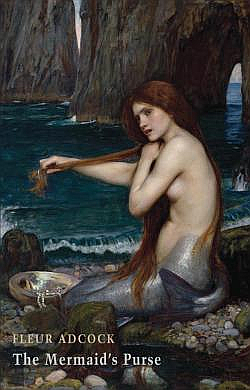 She emigrated to Britain in 1963, working as a librarian in London until 1979. In 1977-78 Fleur Adcock was writer-in-residence at Charlotte Mason College of Education, Ambleside.
She emigrated to Britain in 1963, working as a librarian in London until 1979. In 1977-78 Fleur Adcock was writer-in-residence at Charlotte Mason College of Education, Ambleside.
Fleur Adcock was Northern Arts Literary Fellow in 1979-81, living in Newcastle, becoming a freelance writer after her return to London.
She received an OBE in 1996, and the Queen’s Gold Medal for Poetry in 2006 for Poems 1960-2000 (Bloodaxe Books, 2000).
Fleur Adcock published three pamphlets with Bloodaxe: Below Loughrigg (1979), Hotspur (1986) and Meeting the Comet (1988), as well as her translations of medieval Latin lyrics, The Virgin & the Nightingale (1983).
She also published two translations of Romanian poets with Oxford University Press, Orient Express by Grete Tartler (1989) and Letters from Darkness by Daniela Crasnaru (1994).
All her other collections were published by Oxford University Press until they shut down their poetry list in 1999, after which Bloodaxe published her collected poems Poems 1960-2000 (2000), followed by Dragon Talk (2010), Glass Wings (2013), The Land Ballot (2015) and Hoard (2017).
The Mermaid’s Purse is due from Bloodaxe in 2021. Poems 1960-2000 and Hoard are Poetry Book Society Special Commendations while Glass Wings is a Poetry Book Society Recommendation. In October 2019 Fleur Adcock was presented with the New Zealand Prime Minister’s Award for Literary Achievement in Poetry 2019 by the Rt Hon Jacinda Ardern.
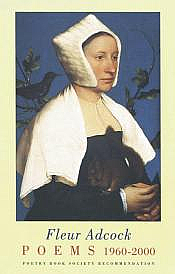 Fleur Adcock writes about men and women, childhood, identity, roots and rootlessness, memory and loss, animals and dreams, as well as our interactions with nature and place. Her poised, ironic poems are remarkable for their wry wit, conversational tone and psychological insight, unmasking the deceptions of love or unravelling family lives.
Fleur Adcock writes about men and women, childhood, identity, roots and rootlessness, memory and loss, animals and dreams, as well as our interactions with nature and place. Her poised, ironic poems are remarkable for their wry wit, conversational tone and psychological insight, unmasking the deceptions of love or unravelling family lives.
Fleur Adcock began writing the poems in this book when she was 82. The two chief settings are New Zealand, with its multi-coloured seas, and Britain, seen in various decades.
There are foreign travels, flirtations, family memories, deaths and conversations with the dead. Katherine Mansfield, incognito, dodges an academic conference; there’s a lesson in water divining as well as a rather unusual Christmas party.
We meet several varieties of small mammal, numerous birds, doomed or otherwise, and some sheep. The book ends with a sequence in memory of her friend, the poet Roy Fisher.
# new poetry
The Mermaid’s Purse
by Fleur Adcock
Publication Date : 25 Feb 2021
Pages: 80
Size: 234 x 156mm
ISBN: 9781780375700
Paperback
£10.99
• fleursdumal.nl magazine
More in: #Modern Poetry Archive, Archive A-B, Archive A-B, Mermaids
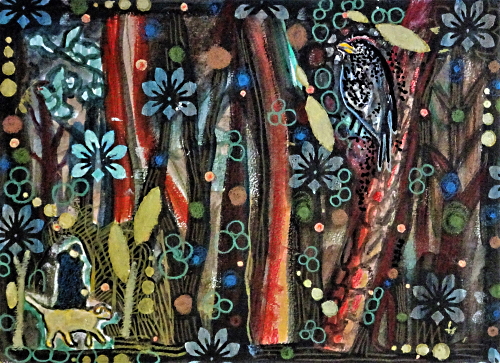
Anne Feddema
Kuierke – Skaad…Ljocht
Wandelingetje – Schaduw… Licht
(Particuliere collectie NL)
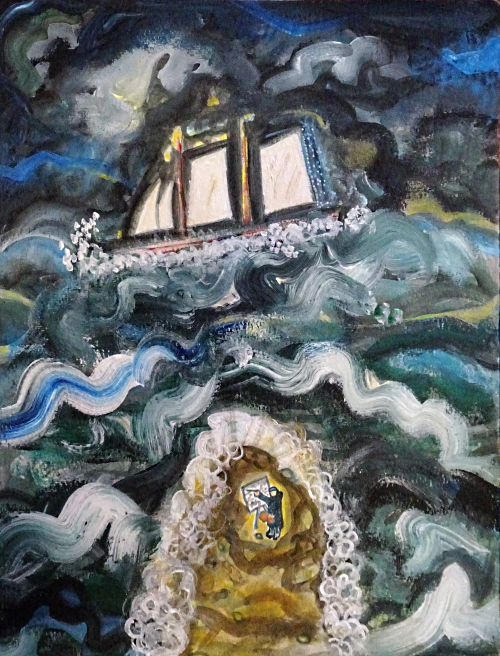
Anne Feddema
Min Waarskilder – Skip
Slecht Weerschilder – Schip
(Particuliere collectie NL)
Anne Feddema (Leeuwarden, 1961) is schrijver, dichter en beeldend kunstenaar. Hij volgde een beeldende opleiding aan het gerenommeerde Ateliers ’63. In 2007 ontving hij voor zijn schilderkunst de Margaretha de Heerprijs en in 2009 de Gysbert Japicxprijs voor Friese literatuur. Zijn beeldend werk is getoond in musea zoals het Groninger Museum, het Fries Museum en Museum Belvédère. Feddema schrijft zowel in het Fries als in het Nederlands. Daarnaast vertaalt hij werk van andere dichters in het Fries. Verder trad Anne Feddema regelmatig op met zijn gedichten, o.a. tijdens het Poetry International-festival in Rotterdam.
©Anne Feddema
• fleursdumal.nl magazine
More in: Anne Feddema, Archive E-F, Archive E-F, Feddema, Anne
![]()
Notitie,
gevonden in een conservatorium
Ik weet wel dat mijn stiltes pijnlijk zijn,
vandaar dat ik niet ieder stuk nog speel.
Een rust in mijn 4’33” wordt niet zelden
ook de doorgewinterd luisteraar te veel.
Paul Bezembinder
Notitie, gevonden in een conservatorium
Gedicht
(Meer over Paul Bezembinder is te vinden op zijn website: www.paulbezembinder.nl)
• fleursdumal.nl magazine
More in: # Music Archive, Archive A-B, Archive A-B, Bezembinder, Paul

Coo-Ee
“Down under” boys on furlough are in town
Discharged from hospital, repaired and braced,
Their faces still retain, their native brown,
Their millinery captivates our taste.
They’ve proved themselves a terror to the Turk,
Of cut and thrust they bear full many a token,
But though they’ve been through grim, heartbreaking work,
The Anzac spirit never can be broken.
Their talk is picturesque, their manner frank,
A little hasty, what they think— they say—
They’ve got a down on arrogance and swank,
Passive submission doesn’t come their way.
Risk and adventure are their fondest joys,
If there’s a fight around, well, they’ll be in it—
To tell the truth, they really are “some” boys—
You get quite friendly with them in a minute.
Quite friendly, yes, no harm in being friends,
They must not find their furlough dull and tame,
But, girls, see to it there the matter ends,
And show thatLondongirls can play the game,
While of good comradeship you take your fill
Don’t use your power to make their hearts your plunder,
But let them pause, and hear when nights are still
The other girl who coo-ees from “down under.”
Jessie Pope
(1868 – 1941)
Coo-Ee
From: War Poems
• fleursdumal.nl magazine
More in: *War Poetry Archive, Archive O-P, Pope, Jessie, WAR & PEACE

I Am Not Yours
I am not yours, not lost in you,
Not lost, although I long to be
Lost as a candle lit at noon,
Lost as a snowflake in the sea.
You love me, and I find you still
A spirit beautiful and bright,
Yet I am I, who long to be
Lost as a light is lost in light.
Oh plunge me deep in love, put out
My senses, leave me deaf and blind,
Swept by the tempest of your love,
A taper in a rushing wind.
Sara Teasdale
(1884-1933)
I Am Not Yours
• fleursdumal.nl magazine
More in: Archive S-T, Archive S-T, Teasdale, Sara

Sydney
In her grey majesty of ancient stone
She queens it proudly, though the sun’s caress
Her piteous cheeks, ravished of bloom, confess,
And her dark eyes his bridegroom glance have know.
Robed in her flowing parks, serene, alone,
She fronts the east; and with the tropic stress
Her smooth brow ripples into weariness;
Yet hers the sea for footstool, and for throne
A continent predestined. Round her trails
The turbid squalor of her streets, and dim
Into the dark heat-haze her domes flow up;
Her long lean fingers, with their grey-old nails,
Giving her thirsty lips to the cool brim
Of the bronze beauty of her harbour’s cup.
Arthur Adams
(1872-1936)
Sydney
• fleursdumal.nl magazine
More in: Adams, Arthur, Archive A-B, Archive A-B
Since 1985, Gregor Schneider has occupied an abandoned house next to one of the largest chasms in the world—the lignite-rich surface mine near Rheydt-Mönchengladbach known as the Garzweiler—which is also next to where his parents ran their business.
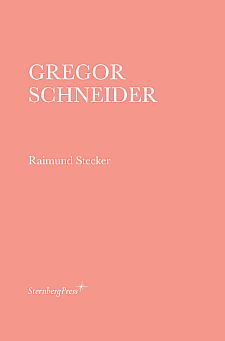 In the building, which he named Haus u r, he proceeded to build rooms within rooms.
In the building, which he named Haus u r, he proceeded to build rooms within rooms.
These eerie spaces are constructed from materials salvaged from the houses that were to be crushed by juggernaut-sized bucket-wheel excavators to expand the mine.
With this publication, art historian Raimund Stecker reconnects with his first visit to Haus u r. Schneider and Stecker have known each other since the artist’s student years at the Münster Academy of Art in the late 1980s.
In 1992, Stecker curated one of Schneider’s first exhibitions, and has closely followed his career ever since.
This book is published on the occasion of Konschthal Esch’s inaugural exhibition, curated by Christian Mosar.
# new books
Gregor Schneider
by Raimund Stecker (Ed.)
January 2022,
German/English
13.4×20.3 cm
112 pages
18 b/w ill.
softcover
ISBN 978-3-95679-635-7
Sternberg Press
Design: Cropmark
Copublisher: Konschthal Esch
Available
€28.00
• fleursdumal.nl magazine
More in: - Book News, - Bookstores, Archive S-T, Art & Literature News, AUDIO, CINEMA, RADIO & TV, Gregor Schneider
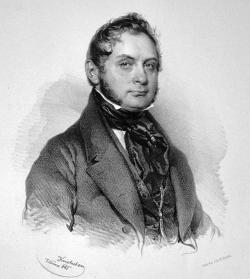
Venedig
Ich bin so krank und sterben möcht’ ich gerne
Hier in Venedig, und begraben liegen
In dieser Flut, dem Ruheplatz der Sterne!
In jeder Nacht pfleg’ ich mich drauf zu wiegen,
Und ihrer Tiefe schwärzeste Geschichten
Behorch’ ich dann mit schaurigem Vergnügen. –
Beschloß der Rat der Drei, geheim zu richten
Ein Opfer, des Geschrei’s im Volke wegen,
Und galt’s ein schnell und spurenlos Vernichten:
Da glitt um Mitternacht, dem Mond entgegen,
Die Gondel aus der Seufzerbrücke Schatten,
So schwarz und still, wie alle Gondeln pflegen.
Und lautlos durch Galeeren und Fregatten
Kroch sie hindurch, bis wo des Meeres Enge
Sich dehnt zu breiteren, smaragdnen Matten.
Dort hielt sie still. Dann aber war’s, als sprenge
Ein dumpfer Fall die kaum bewegte Fläche,
Und leise Kreise zitterten in Menge.
Auch war’s den Schiffern, die im Nachtgespräche
An Lido’s Ufern stellten ihre Stricke,
Als ob ein Schrei im Wellenschlag zerbräche.
Die stille Gondel aber schwamm zurücke,
Wie sie gekommen, spurlos und verborgen,
Und schwand im Schattenstreif der Seufzerbrücke:
Doch der Verbrecher starb am andern Morgen.
Moritz von Strachwitz
(1822 – 1847)
Venedig
Moritz Karl Wilhelm Graf von Strachwitz (1822-1847), deutscher Dichter
Lithographie von Josef Kriehuber, 1841
• fleursdumal.nl magazine
More in: # Classic Poetry Archive, Archive S-T, Archive S-T
Thank you for reading Fleurs du Mal - magazine for art & literature